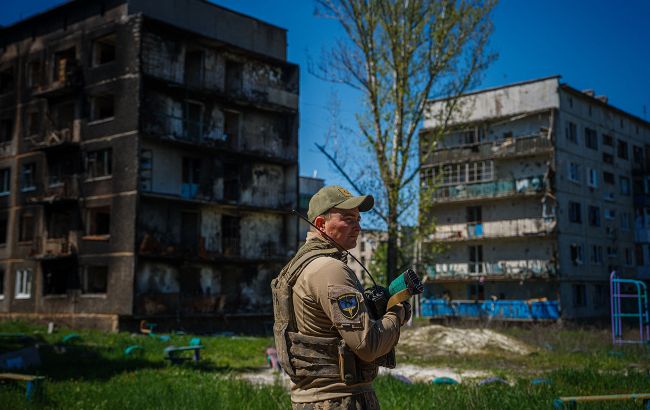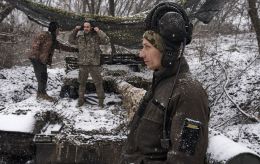Artillery fire and Bulgakov's book: Report from Chasiv Yar under enemy shelling
 War in Chasiv Yar (Photo: GettyImages)
War in Chasiv Yar (Photo: GettyImages)
Ten kilometers away from Bakhmut, the settlement of Chasiv Yar suffers the fate of the "salt capital" (Soledar – Ed.). Over the past few months, Russians have bombed and depopulated this town, leaving behind craters and a lack of civilization. Today, heavy artillery strikes don’t spare anyone or anything. RBC-Ukraine journalists, together with soldiers from one of the brigades in this direction, also found themselves under artillery fire. RBC-Ukraine reports on the situation in the town and the moments of the enemy strikes.
"Get down when you hear the explosion! They've been targeting us recently!"
As we enter Chasiv Yar, located just beyond Bakhmut, we smell the persistent scent of gunpowder. Enemy artillery strikes are ceaseless. The driver accelerates to traverse this stretch of road because it is under constant fire.
"Do you see the craters in the asphalt? Those are shellings. Oh, this one is new, it appeared within the last hour," explains the soldier with the call sign "Phil".
Phil is originally from the Poltava region. When the full-scale war started, he was 19 years old. He immediately went to serve and today he has one of the tasks in the brigade – transporting soldiers to their positions. Now he maneuvers the steering wheel of a "Zhiguli" to avoid being hit by artillery fire.
As we pass street after street, we see the dense dust rising over the shelled city. The flames of the enemy “dragon” creeps closer to the next settlement after Bakhmut, as the Ukrainian defense forces try to suppress it.
Chasiv Yar, located 10 kilometers from Bakhmut, is currently enduring the blows of heavy weaponry. As we approach the gathering place of the locals, we hear muffled sounds of explosions resonate every minute.
The locals are not very talkative. Some completely avoid strangers, closing the entrance doors right in front of our faces. Soldiers say that some locals support the "Russian world" and dismiss arguments about enemy rockets landing directly in people's houses. However, the majority of the remaining population considers themselves Ukrainians and wants to live in their own country without Russians.
We meet forty-year-old Mrs. Vira, who used to work at the plant before the invasion. Today, she remains in the city without water, electricity, and heating. She says that her husband and she have no place to go and they are left alone.
"We will stay here. We won't go anywhere. We support the Ukrainian Armed Forces and wait until the front line shifts," she says.

Vira refuses to leave Chasiv Yar (Photo: Anastasiia Rokytna/RBC-Ukraine)
People try to stick together in such conditions, often saying that they have no money to leave. Despite this, some of them wander the streets drunk, although the prohibition regime is in effect in this region, and the shops are no longer open.
It seems that nothing works here anymore. The closer Ukrainian cities get to the "Russian world," the more they resemble the devastated Aleppo in Syria after the bombings. Even breathing is difficult here: you can smell the gunpowder after the artillery fire and constant dust after buildings collapse.
In this chaos, the Radchenko family – Valia, the mother, and Ihor, the son – lives on. They are among the few locals willing to engage with us immediately. At times, it seemed like they had forgotten that they lived in a city on the verge of destruction. They laughed and joked. The young man held a copy of Bulgakov's "The Master and Margarita" in his hands. Reading is perhaps the only solace in such conditions.
"We are not planning to leave just yet. Soldiers support us. They share food and water. That's how we live. Ihor studied psychology at the university, and I worked at the plant. Now there are no conditions for that," Valia says.

Mother and son stay in the town (Photo: Anastasiia Rokytna/RBC-Ukraine)
As we were leaving, they wished us peace and safety. Perhaps these people, more than anyone else, understand the meaning of these words. In Chasiv Yar, they have already forgotten this concept; they understand better when it is "outcoming" or "incoming" artillery rounds. They know they need to run to a shelter when the strikes come closer. The sirens are gone, destroyed long ago. So the locals either live in shelters or their apartments, with the belief that the enemy shells won't reach them.
While walking through the town streets, the Russian reconnaissance drone "Orlan" started operating. They identify the locations of military equipment and provide coordinates to the artillery. We felt their strikes first from 200 meters away, then from 150.
"Run to the shelter! They're ramping up bombing again," shouted one of the soldiers.
We ran to the shelter, feeling the ground trembling beneath our feet. Our forces began to fire in response, and the strikes became heavier. An artillery duel began. While we sat in the shelter, we heard the whistling of shells. But as the soldiers say, if you can hear the sound, it's flying overhead. If there's a loud explosion, it landed nearby. And this just happened, when we were discussing the situation on the Bakhmut front with a soldier.
"That just landed! 30 meters away. Right where you were just standing," a soldier who rushed in tells us. "You're lucky you made it here in time; the vehicle took a hit. It'll need repairs."
A series of similar explosions followed. The artillery duel lasted several hours. During this time, all we could do was wait. It is the moment when you reevaluate priorities and return to the basics: the main goal is to survive. And whoever is by your side at that moment, whether an old friend or someone you just met, automatically becomes someone you can trust.
That's probably how the brotherhood among soldiers emerges. Now, under such circumstances, they joke about death and share long-held dreams. It helps distract from the external chaos.
"They are hunting us right now. Searching for places where fighters might be. Although they can't find us, they still bring damage, both to the town and civilians," says Phil.
Today, Russians are targeting the town, which is considered a vital supply route for Ukrainian forces involved in heavy fighting in Bakhmut and its vicinity. The soldiers say that today, "new personnel" likely arrived on the positions, so they're being tested. In response, our forces fire back, trying not to hit but to protect the population.
When the battle subsided, we stepped out onto the street. Dust and the smell of gunpowder filled the air. For the soldiers, these are ordinary conditions. Working on the verge of life, they defend our freedom every day, seemingly fearing nothing anymore.
As we left Chasiv Yar, the sun was setting on the horizon. Whether in the burning Bakhmut or peaceful Kyiv, it casts the same shades but holds different meanings for those who gaze upon it.

